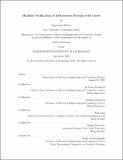Modular Verification of Distributed Systems with Grove
Author(s)
Sharma, Upamanyu
DownloadThesis PDF (569.8Kb)
Advisor
Kaashoek, M. Frans
Zeldovich, Nickolai
Terms of use
Metadata
Show full item recordAbstract
Grove is a new framework for machine-checked verification of distributed systems. Grove focuses on modular verification. It enables developers to state and prove specifications for their components (e.g. an RPC library), and to use those specifications when proving the correctness of components that build on it (e.g. a key value service built on RPC).
To enable modular specification and verification in a distributed systems, Grove uses the idea of ownership from separation logic. Using Grove, we built a verified unreliable RPC library, where we captured unreliability in the formal specification by using duplicable ownership. We also built a verified exactly-once RPC library, where we reasoned about ownership transfer from the client to server (and back) over an unreliable network by using the escrow pattern.
Overall, we developed and verified an example system written in Go consisting of the RPC libraries, a sharded key-value store with support for dynamically adding new servers and rebalancing shards, a lock service, and a bank application that supports atomic transfers across accounts that live in different shards, built on top of these services. The key-value service scales well with the number of servers and the number of cores per server. The proofs are mechanized in the Coq proof assistant using the Iris library and Goose.
Date issued
2022-09Department
Massachusetts Institute of Technology. Department of Electrical Engineering and Computer SciencePublisher
Massachusetts Institute of Technology